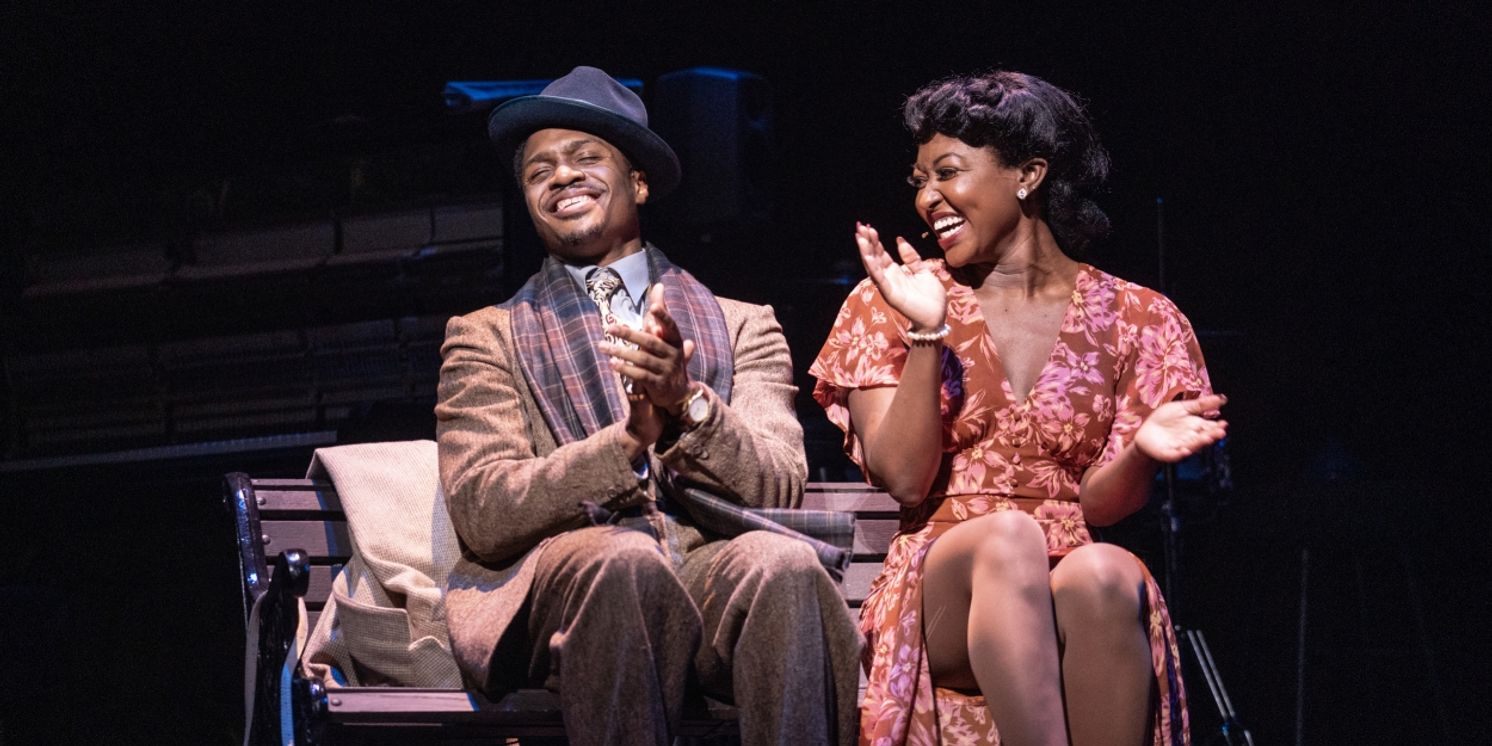Review Roundup: PAL JOEY at New York City Center
Pal Joey is running at New York City Center through November 5.

NEW YORK CITY CENTER is presenting Pal Joey! which just opened with a benefit performance and runs through November 5, celebrating 80 years at the center or the arts, followed by a gala dinner at the Ziegfeld Ballroom.
In this revival, reconceived by co-director and choreographer Savion Glover and co-director Tony Goldwyn, Joey Evans (Ephraim Sykes) is a Black jazz singer who refuses to compromise on his craft as he struggles to make it big on the Chicago nightclub circuit. With a new book by Richard LaGravenese and Daniel “Koa” Beaty, the production reimagines Linda English (Aisha Jackson) as a radio chanteuse trying to find her authentic voice, and Vera Simpson (Elizabeth Stanley) as a liberated white socialite following her passions.
Rodgers and Hart classics like “Bewitched, Bothered and Bewildered,” “Do It the Hard Way,” “I Could Write a Book,” and “That Terrific Rainbow” are joined by gems like “I Wish I Were in Love Again,” “Falling In Love With Love,” “My Heart Stood Still,” “The Lady Is a Tramp,” and “This Funny World.”
![]() Jesse Green, New York Times: You can certainly count on coherence from the songs themselves, no matter how randomly they sometimes seem to have been placed in one Rodgers and Hart show instead of another. Even completely shorn of plot relevance, they are evergreen for a reason. Though this “Pal Joey” rightfully questions the appropriation of Black voices in American popular song — referring to the King of Jazz, Paul Whiteman, and the King of Swing, Benny Goodman, Joey says, “Awful lot of Kings out there playing our music” — it’s strange to build that argument on the back of these standards. If they’re the problem, why celebrate them, and make them sound so good in the process?
Jesse Green, New York Times: You can certainly count on coherence from the songs themselves, no matter how randomly they sometimes seem to have been placed in one Rodgers and Hart show instead of another. Even completely shorn of plot relevance, they are evergreen for a reason. Though this “Pal Joey” rightfully questions the appropriation of Black voices in American popular song — referring to the King of Jazz, Paul Whiteman, and the King of Swing, Benny Goodman, Joey says, “Awful lot of Kings out there playing our music” — it’s strange to build that argument on the back of these standards. If they’re the problem, why celebrate them, and make them sound so good in the process?
![]() Robert Hofler, The Wrap: Sykes, to his credit, doesn’t ask for our sympathy the way his dialogue begs for it. In a normal “Pal Joey,” he would be a great Joey. He exudes confidence without ever pushing it, and especially affecting is the understated way he unveils a song like “I Could Write a Book.” He leaves the over-emotive deliveries to his two leading ladies. Tony Goldwyn and Savion Glover direct, and Glover also choreographs. Tap-dancing spirits (called “griots” in the credits) follow Sykes around the stage. They don’t provide segues between scenes so much as they remind us that several elements of this production, including these dancers, have absolutely nothing to do with what Rodgers and Hart — not to mention O’Hara — wrote.
Robert Hofler, The Wrap: Sykes, to his credit, doesn’t ask for our sympathy the way his dialogue begs for it. In a normal “Pal Joey,” he would be a great Joey. He exudes confidence without ever pushing it, and especially affecting is the understated way he unveils a song like “I Could Write a Book.” He leaves the over-emotive deliveries to his two leading ladies. Tony Goldwyn and Savion Glover direct, and Glover also choreographs. Tap-dancing spirits (called “griots” in the credits) follow Sykes around the stage. They don’t provide segues between scenes so much as they remind us that several elements of this production, including these dancers, have absolutely nothing to do with what Rodgers and Hart — not to mention O’Hara — wrote.
![]() Sandy MacDonald, New York Stage Review: Still, the story line remains more or less on track so far. It’s in bumping a hitherto peripheral character – the nondescript, nonsinging, nondancing club manager – to the fore that the rewriters simultaneously triumph and overstep. As the updated counterpart, de facto den mother Lucille Wallace, Loretta Devine (who achieved stardom with Dreamgirls) is assigned a number of songs that challenge her current vocal capabiity. Text-wise, she’s fantastic, “Lu” having been assigned all the wittier, more insightful lines. As for her side-plot romance with Vera’s fixer, Tony? Conveying not the slightest trace of thuggish menace (would that be un-PC?), Jeb Brown plays the gangster like a benign Park Avenue toff who thinks that he’s the main story.
Sandy MacDonald, New York Stage Review: Still, the story line remains more or less on track so far. It’s in bumping a hitherto peripheral character – the nondescript, nonsinging, nondancing club manager – to the fore that the rewriters simultaneously triumph and overstep. As the updated counterpart, de facto den mother Lucille Wallace, Loretta Devine (who achieved stardom with Dreamgirls) is assigned a number of songs that challenge her current vocal capabiity. Text-wise, she’s fantastic, “Lu” having been assigned all the wittier, more insightful lines. As for her side-plot romance with Vera’s fixer, Tony? Conveying not the slightest trace of thuggish menace (would that be un-PC?), Jeb Brown plays the gangster like a benign Park Avenue toff who thinks that he’s the main story.
Average Rating: 50.0%
- To read more reviews, click here!
- Discuss the show on the BroadwayWorld Forum
Reader Reviews
Powered by
|
Videos

